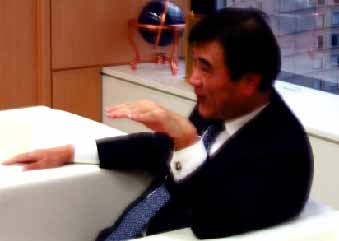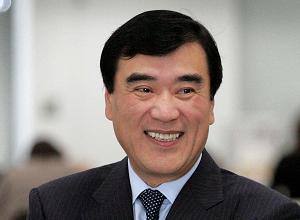Basketball with Bryant sensei
- 2007/09/27 19:37

Challenges in Japan
and his lessons for the ‘game of life’
Joe Bryant, also known as coach or ‘sensei’ to the Tokyo Apache team stands tall at
207cm high. As a child, He carved a mark in NBA as Joe `Jellybean` Bryant, a man known for his skills at the hoop and his soft spot for jellybeans. When Bryant named his son Kobe after the famous Kobe beef, his interest in Japan was sealed. To date, Bryant has lived in
Japan for 3 years stating his love for the good food and the great service. Unfortunately,
shopping was not part of the list, as clothes here don’t seem to come in his size. Warm
and friendly, he was ready to field our questions with a smile on his face.
207cm high. As a child, He carved a mark in NBA as Joe `Jellybean` Bryant, a man known for his skills at the hoop and his soft spot for jellybeans. When Bryant named his son Kobe after the famous Kobe beef, his interest in Japan was sealed. To date, Bryant has lived in
Japan for 3 years stating his love for the good food and the great service. Unfortunately,
shopping was not part of the list, as clothes here don’t seem to come in his size. Warm
and friendly, he was ready to field our questions with a smile on his face.


1) Would you mind sharing with us what made you want to
become a basketball player?
I used to play baseball when I was a kid but since I was tall,
I was asked to play basketball instead. Also, I was able to
get a scholarship into a university and that was probably
the most important thing. In reality, it is difficult for parents
to spend that money to go to college.
2) Speaking of names, I’m aware that your son Kobe was
named after the Kobe beef. How far back have you had an
interest in Japan?
It’s a true story. My wife and I went to a restaurant and had a
steak named Kobe. The restaurant was also named after the
steak so we found that very interesting. When we asked what
it meant, they said it meant tender beef and also the name of
the city.We wanted to name our child after interesting names
which weren’t like Joe, Tom… We wanted it to be a little bit
different.
become a basketball player?
I used to play baseball when I was a kid but since I was tall,
I was asked to play basketball instead. Also, I was able to
get a scholarship into a university and that was probably
the most important thing. In reality, it is difficult for parents
to spend that money to go to college.
2) Speaking of names, I’m aware that your son Kobe was
named after the Kobe beef. How far back have you had an
interest in Japan?
It’s a true story. My wife and I went to a restaurant and had a
steak named Kobe. The restaurant was also named after the
steak so we found that very interesting. When we asked what
it meant, they said it meant tender beef and also the name of
the city.We wanted to name our child after interesting names
which weren’t like Joe, Tom… We wanted it to be a little bit
different.
3) What attracted you to Japan? Is there a favorite part of the Japanese culture that you
are interested in?
I am definitely interested in the culture. As I get older, I want to travel and experience
different cultures. I had a chance to live in Europe for 8years and when the opportunity
came along to come to Asia, it was a ‘no brainer’ and I accepted the challenge.
I think the food is good. There are some sushi I ate. I also like the professionalism and
the services here. I think one of the hardest things for me here is walking through the
subway. At some of the stations, I keep bumping my head.
are interested in?
I am definitely interested in the culture. As I get older, I want to travel and experience
different cultures. I had a chance to live in Europe for 8years and when the opportunity
came along to come to Asia, it was a ‘no brainer’ and I accepted the challenge.
I think the food is good. There are some sushi I ate. I also like the professionalism and
the services here. I think one of the hardest things for me here is walking through the
subway. At some of the stations, I keep bumping my head.
HC Joe Jelly Bean Bryant

Tokyo Apache's head coach and former NBA player. Also is father of Kobe Bryant who is the NBA superstar.
Tokyo Apache's coach extremely popular to children always!
1954.10.19 H:207cm W: 112kg
Tokyo Apache's coach extremely popular to children always!
1954.10.19 H:207cm W: 112kg

















